Staff Inquiry: Our Favorite Coming-Of-Age Films

Alex is a film addict, TV aficionado, and book lover.…
For this month’s staff inquiry, our writers are looking at some of their favorite coming-of-age films. These turbulent times generate so many excellent stories that there’s a wealth of movies to chose from, each with different approaches and styles. Do you prefer hard-nosed realism or more aspirational takes? Or maybe you want the trials of these young folks to reflect a larger societal ill, or maybe you want to run as far away from an adult perspective as you can.
Whatever you’re looking for, you’ll find that reflected somewhere in our picks. We’ve gone through the options with a fine-toothed comb, and as so often happens, we’ve found that we don’t always agree on what makes these films great. And so we give you the variety, each offering their own unique strengths.
Gus Edgar – The Long Day Closes (1992)
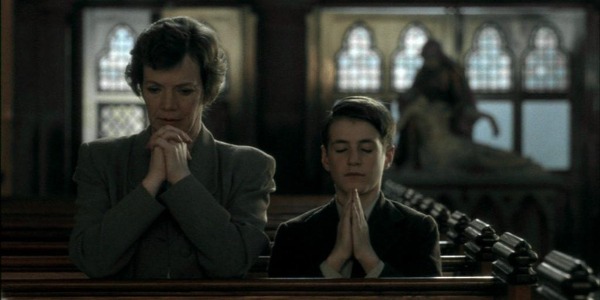
Richard Linklater’s scintillating Boyhood is just as deserving, but I wanted to try gushing about a coming-of-age film where the ‘coming of age’ happens not through the present but through the past. Terence Davies’ semi-autobiographical The Long Day Closes is the type of film I dream about watching – which is apt, considering it takes on a very dreamlike quality. In one scene, our protagonist Bud daydreams and we cut immediately to a sail billowing in the wind, then we return to the young boy now sopping wet.
But this isn’t a bildungsroman seen through the lens of dreams; it’s seen through the lens of memories – though what’s the difference? In ’50s Liverpool, for a preteen film lover, every frame is a gateway to a movie of your own creation. As Bud looks out windows and doors, the magic appears. Couple that with impressionist imagery and a non-diegetic soundtrack plucked from old Hollywood movies that flit in and out of earshot, and it’s clear that The Long Day Closes is dripping in cinephiliac ecstasy.
Davies’ film is a collage of moments, a memorialised tapestry that flows effortlessly from one scene to the next, a sublime cacophony of noise and colour and emotion and adoration and suppression and the process of smooshing all of these into a memory itself. Much like Boyhood, we hardly see a defining moment in the protagonist’s childhood, but rather a gaggle of disparate occurrences that coalesce in style to form a complex whole. And hey, even if you’re still not a fan of it, there’s still no denying how exquisite The Long Day Closes’ ‘Tammy’ centerpiece is, where music, moments and memory are at their most harmonious.
Corey Hughes – American Honey (2016)

Written and directed by British social realist Andrea Arnold, American Honey is based on the true experiences of mag crews in the US and soon will be considered a timeless coming-of-age story. The film is tailored around the experiences of Star, a volatile, ambitious, and vulnerable teenager whose electrifying nature is matched only by the actress that plays her, Sasha Lane.
Brought to life in a devoted debut performance, Star leaves behind the shackles of social determinism and heads on the road with a group of like-minded social outsiders lured by the promise of escape from a world that promises nothing. Set against the backdrop of core social realist ideologies, particularly the prevalence of poverty, Arnold’s story is one that is seeping with poeticism and allegory; nuances that define the female director as a remarkably talented filmmaker.
Yet it’s the sense of camaraderie among the unruly group of misfits that separates Arnold’s coming-of-age story from the rest. Brought to life by an ensemble of non-professional actors (besides Shia LaBeouf as Star’s love interest), American Honey is a film brimming with genuine, raw performances that give the story a true sense of verisimilitude. It’s a tender, terrifying, passionate, but above all real account of youthful depravity helmed by one of cinema’s most poetic filmmakers.
Nathan Osborne – Love, Simon (2018)
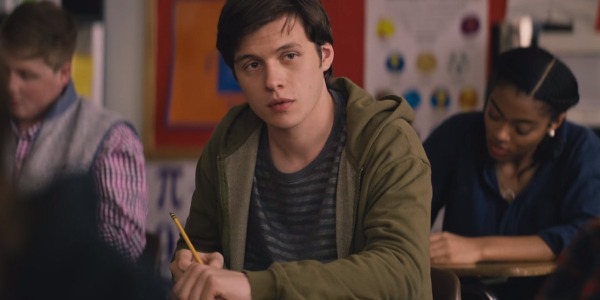
You can breathe now, Simon.
Love, Simon may have only been released in theatres this year but its impact has already been astronomical. All over the world, the story of Simon Spier has inspired and moved countless teens struggling with their identity, offering a safe space and providing them with the words they needed to hear their whole life. That’s the power not only of this specific film but of the coming-of-age subgenre as a whole.
Sure, Love, Simon uses a few genre cliches and tropes in its storytelling, but its framing of a gay character and his journey to acceptance makes it groundbreaking and powerful filmmaking. Fox is the first major Hollywood studio to release a romance film based on a gay character, and while it sure is glossy, it documents the various stages of growth — denial, anger, acceptance, maturity – and the obstacles of growing up so perfectly and deftly.
Many people, including those outside the LGBTQ+ community, will be able to relate to the world this film builds – one that feels fleshed out by personal life experiences – and its crowd-pleasing appeal means it can be easily-accessed by a cross section of people. It’s been inspiring to see the varied audience attending screenings, from young to old with everything in between. It’s what makes the genre so incredible; we all have our unique stories to tell and experiences to share, with Love, Simon’s choice to find a new perspective resulting in a rather extraordinary film.
Love, Simon isn’t only a massively important moment for cinema, but it happens to be a really good, quite brilliant film. The refreshed perspective, heartfelt filmmaking techniques and impressive performances across the board help ensure that its impact will be felt far and wide and remembered for years to come by those who have taken it into their hearts. Nick Robinson and director Greg Berlanti’s noteworthy efforts provide a touching, life-affirming story that will become something of a mantra; an inspiring piece of filmmaking the world needs.
Matthew Singleton – Stand by Me (1986)
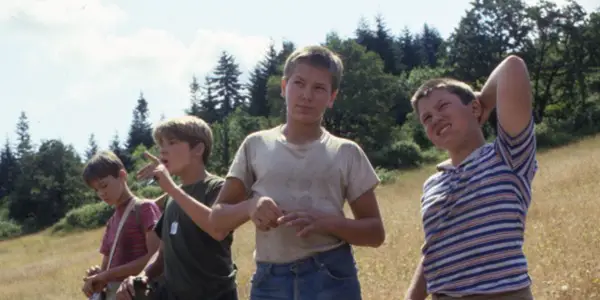
I’ve always had a soft spot for coming-of-age films, and Stand by Me ranks atop my pile. This incredibly quotable tale of four friends searching for the body of a missing child barely feels like it’s aged a day, holding up as all classics do. In preparation for this article, I watched the film again. As adult Gordie sat in his truck having just learnt that his old friend Chris Chambers had been fatally stabbed and Ben E King’s ‘Stand by Me’ started up, I was sucked right back in.
Stand by Me benefits greatly from its incredibly talented young cast. River Phoenix is fantastic as leader Chris, a kid who’s misunderstood because of his family, and he matches up perfectly with Wil Wheaton’s sensitive Gordie. The rest of the main quartet are equally strong with Corey Feldman as the army-loving Teddy and Jerry O’Connell as the timid Vern. I also have to mention Kiefer Sutherland absolutely killing it as the vintage older bully, Ace.
Watching the four protagonists interact remains a joy even thirty years after release. The magic of the film is in the quiet moments of the four friends hanging out as they walk along the railroad tracks or talk around the campfire. The boys messing around, tussling on the floor, and ribbing one another as kids do is timeless.
Like all great coming-of-age films, Stand by Me mixes the past with the present and the looming future. These kids are on another summer adventure born from the repetition of days in the sun, and whilst they live in the very real present where friendships burn brightest, they quietly struggle with their pasts and question what will become of their friendship in the years to come.
This Stephen King adaptation represents perhaps better than any other film the wonderful innocence of childhood in those sprawling summers. The characters are complex, the scorching setting is rose-tinted, and the soundtrack is frankly superb. Stand by Me manages a perfect blend of nostalgia and adventure in just 85 minutes.
Kristy Strouse – Almost Famous (2000)

Almost Famous not only encapsulates youth and the beautiful journey that growing up can be, but it also captures the time and music of the ’70s. It’s a state of mind, and it’s a carefully crafted film that manages to be genuinely meaningful and funny. Along with the great soundtrack the movie has a stellar cast and a plenitude of memorable moments.
Film and music each hold a place in my heart, so it’s difficult not to fall in love with Cameron Crowe’s 2000 movie. When it came out, part of the appeal was wish fulfillment and the other was the recognizable naivety of William (Patrick Fugit). His innocence is so relatable that you want to give him a hug with every turn.
I couldn’t help but crave this story for my own. These impressionable years are crucial to who you are and how you become that person. He’s ushered into his future with bright lights and blaring guitars, and it’s glorious.
William (the enemy) is swept up into this rock and roll tundra in an almost unbelievable fashion and is thrust into maturity amongst the company of those who seemingly don’t grow up. Because of that, the coming-of-age element isn’t restricted to just his character.
With a superb supporting cast, including the late, great Philip Seymour Hoffman, it’s just the right dose of reality saddled with the spirit of a dreamer.
This is a film that throbs with both purpose and excitement, making it nearly impossible to not adore it. If you’re a fan, I recommend the directors cut for more opportunity to experience this classic in all of its intended glory.
Benjamin Wang – Where is My Friend’s House? (1987)
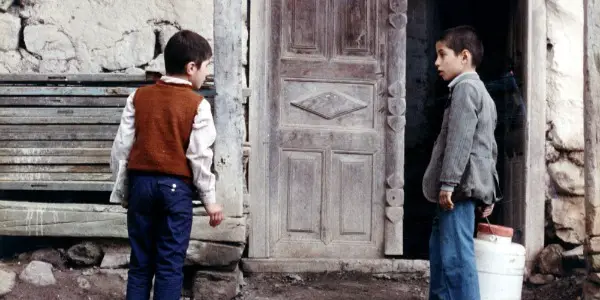
Where is My Friend’s House? is the second feature film of the idiosyncratic director Abbas Kiarostami. Like many of his earlier short films, Where is My Friend’s House? unfolds from a seemingly simple problem faced by a young schoolboy.
It follows a child named Ahmad’s efforts to return a notebook he accidentally took from one of his classmates at school. He receives directions to his friend’s home and tries to follow landmarks, but none are quite specific enough. He sees what he thinks are his friend’s clothing on a clothesline; it turns out to be a lookalike. He’s told to look for a house with a blue door; he finds more than one, and the right one is vacant when he arrives. It’s probably not a mistake that the film’s story doesn’t properly start until he decides to disobey someone’s directions.
Ahmad has some of the details he needs to find what he’s looking for, but not all of them. It’s a simple fact of life that this sometimes happens to us. It’s why lookalikes can be deceptive and why following directions isn’t always easy. What makes Where is My Friend’s House? a coming-of-age film is its depiction of a child beginning to confront this fact and changing his way of thinking – though it also finds that adults can easily forget it. Its claim to greatness is evidenced best by its final scenes and their suggestive imagery of shadows, lights shining through windows, and wind blowing over debris and through hanging fabric: it reminds us what it feels like for a way of thinking to change.
Emily Wheeler – The Perks of Being a Wallflower (2012)
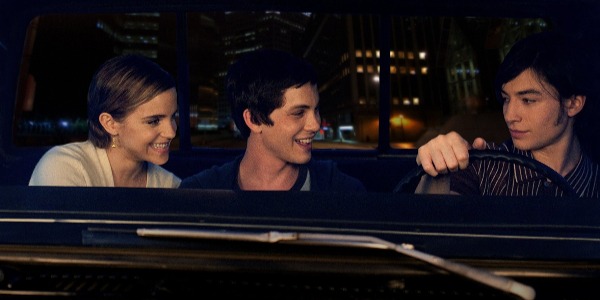
I’m many years out from high school, far enough along that faces have become blurred and memories are more muted, impressionistic flashes than anything else. I’ve formed a narrative about that time, but it’s one that’s been filled in with extra information and filtered through a broader perspective. In other words, the high school years I remember are not the high school years I lived. That’s probably why I’m so drawn to The Perks of Being a Wallflower, which rides its own fine line between being an idealized fabrication and a honest look at difficult times.
The films centers on Charlie (Logan Lerman) as he joins a group of older friends that introduce him to passions, freedom, and fun. There’s the clichéd stuff like drugs and The Rocky Horror Picture Show, but there’s also painful secrets lingering about. Patrick (Ezra Miller) is in a closeted, toxic relationship with a football star, Sam (Emma Watson) is trying to bounce back from years as a hard partier, and Charlie has some serious mental health issues.
All of this is crunched into an arc that feels comfortably familiar, but it’s only storybook in form and not function. Charlie comes of age by dealing with the darker realities of life, and it’s something we leave him still sorting out. Because really, coming of age is about taking on issues you will confront for the rest of your life, not about finding all the answers.
Tynan Yanaga – American Graffiti (1973)
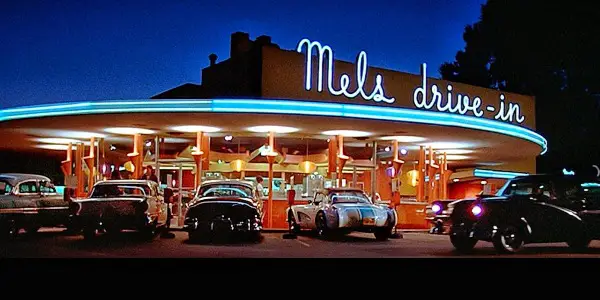
I was recently taken with the idea that while numerous modern bildungsroman stories seek to be love letters to some formative period in life – usually high school – some of the finest cinematic examples of such narratives do well to plant us directly in that reality. It sounds simple, but they lack angsty indie cynicism where stories feel contrived and we can see intelligent screenwriters spinning their webs behind the scenes.
I’ll admit that coming-of-age stories are unreservedly a guilty pleasure of mine, so I relish these aforementioned tales. Also, I’m decidedly nostalgic — fond of wistful reminisces, sometimes to the detriment of my living in the present.
All this is to say I realized a portrait like George Lucas’s American Graffiti is one of the pinnacles of this mode of storytelling because, yes, it’s nostalgic, and yes, the soundtrack is layered with classics, and it does a phenomenal job of taking us back to a certain time and place.
But that’s just it. With every vignette motoring us around Modesto, California circa 1962 we feel like we’re really immersed in that culture for one particular night. It’s not about evoking some reevaluation or newfound revelation from the lives of these teenagers. It’s not about anything particularly profound at all and yet it’s no less diverting – no less meaningful – cruising down the strip, searching after a phantom blonde in a white T-Bird, or doing your best to buy a bottle of Old Harper.
It thrives in being authentically human, making me recall some of the best times I had when I was with friends – times that were exuberant and joyful – not yet weighed down by a plethora of responsibilities. Certainly, there was still a fear of the unknown but that’s precisely it. Only in hindsight can you begin getting introspective about the years that came before. You don’t have time for framing devices as a teenager because you’re too busy living.
There you have it, our favorite coming-of-age films! What are yours?
Does content like this matter to you?
Become a Member and support film journalism. Unlock access to all of Film Inquiry`s great articles. Join a community of like-minded readers who are passionate about cinema - get access to our private members Network, give back to independent filmmakers, and more.
Alex is a film addict, TV aficionado, and book lover. He's perfecting his cat dad energy.













